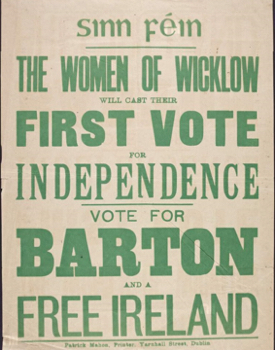
1918 Election Poster (National Library of Ireland)
The 1918 General Election: A new democracy
For the first time, due to the Representation of the People Act, working-class men over 21 years and women over 30 years (under certain conditions) could vote in parliamentary elections. In Ireland, this resulted in a land-slide victory for Sinn Féin who took 73 of the 105 Irish seats at Westminster and went on to form the first Dáil in Dublin on the 21st of January 1919.
Indeed, County Wicklow returned two Sinn Féin TD’s to that first sitting of the Dáil in 1919 – Sean Etchingham for the constituency of East Wicklow (the IRB man defeated Irish Party candidate D.J. Cogan) and Robert Barton for the constituency of West Wicklow.
Wicklow County Council calls for nationalist candidates
The election was arguably one of the most important events in the creation of the Irish republic, but it was preceded by dramatic reform in Irish local democracy with the formation of the county council system in 1899. The old Grand Juries and Boards of Guardians, dominated by the landowning classes, were replaced by democratically elected county councillors. The Local Government (Ireland) Act of 1898 also extended the franchise to most occupiers of property and included women for the first time. As a result, nationalist candidates won the majority of seats and most county councils, including Wicklow, were predominantly nationalist.
Prior to the general election of 1918, a meeting of Wicklow County Council in November of that year passed the following resolution calling all delegates of public bodies in the county to select nationalist candidates for the upcoming parliamentary elections:

Extract from Wicklow County Council minute book, 18th November, 1918 (Wicklow County Archives)
 Postcard of First Dáil, Mansion House, April 1919 – Barton second from the left in the last row
Postcard of First Dáil, Mansion House, April 1919 – Barton second from the left in the last row
The council resolved in June and November 1920 to acknowledge the authority of the new Dáil and to end all communications with the British Local Government Board:

Extract from Wicklow County Council minute book, 18th June, 1920 (Wicklow County Archives)

Extract from Wicklow County Council minute book, 15th November, 1920 (Wicklow County Archives)
First minister for agriculture

Courtesy of www.dail100.ie
Robert Childers Barton of Annamoe, an extensive landowner and former British army officer joined the republican movement having been greatly impacted by witnessing the treatment of the 1916 rebels. At that first Dáil sitting in 1919, as TD for West Wicklow, he was named first minister for agriculture. Establishing the National Land Bank, Barton worked with the Land Commission and the Dáil courts to redistribute land through co-operative farming societies.
Arrest and imprisonment
Barton was arrested by the British in February 1919 for making seditious speeches at Carnew and suffered very harsh treatment in prison, before being finally released in 1921 to assist with the truce negotiations in London. While in prison, Wicklow County Council honored Barton by making him chairman of the council at a meeting in June 1920 and formally objecting to his imprisonment:

Extract from Wicklow County Council minute book, 18th June, 1920 (Wicklow County Archives)
Truce and civil war
Having reluctantly signed the Treaty in 1921 as a member of the Irish delegation in London, Barton was re-elected to the Dáil in 1922 but did not take his seat. He joined the anti-treaty side during the civil war in support of De Valera and was again imprisoned and eventually released in December 1923. See below extract from a letter from the West Wicklow Sinn Féin Comhairle Ceantair to Barton, in an effort to persuade him back to public life:

Extract from letter from West Wicklow Comhairle Ceantair to R. Barton (Wicklow County Archives)
“Wicklow people will remember that it was only after pressure was brought to bear on you that you, with much reluctance accepted the responsibility entailed ….. how heavy those responsibilities proved to be, none of us could then foretell, but as time went on, and the conflict became more severe, we knew that we had chosen rightly when we appointed you as the standard-bearer of our liberties”.
After the election of Fianna Fail in 1932, Barton eventually returned to public life serving as chairman of the Agricultural Credit Corporation and later Bórd na Móna among other public appointments and commissions.
Sources
For more on the 1918 General Election and the first Dáil see the following resources:
“Pledge Ourselves and Our People” – Irish Archives Resource
The Treaty Exhibition – National Archives of Ireland
See also, Wicklow in Revolt: A History of County Wicklow from 1913-1923, Henry Cairns ed. (Old Bray Society, 2016)
Also, for more detailed information on Robert Barton, see the short biography at the end of the page, courtesy of the Treaty Exhibition (National Archives of Ireland).




No Comments
Add a comment about this page